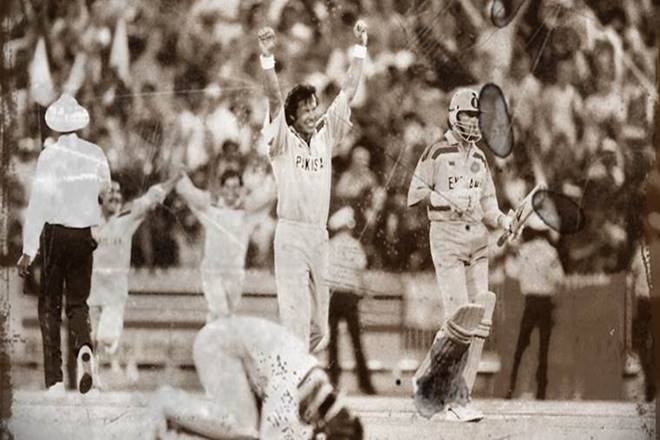As Imran Khan missed an absolute majority by a coat of varnish, but secured the majority’s mandate in the Pakistan general elections to become the Prime Minister-elect, a video message landed on this correspondent’s WhatsApp. It was Javed Miandad explaining how his video post the previous day, condemning the “horse-trading” following the electoral verdict, was misinterpreted by a section of the media.
“A person did a lot of hard work (as a politician), raised the slogan for ‘Naya Pakistan’, and now he has come to the position to lead the country. Some people are trying to subvert people’s mandate. I condemned that. I played with Imran for 20 years. I can give a guarantee as far as he is concerned. All my family members voted for him. He was my captain,” the former Pakistan batting great said.
Khan was Pakistan’s captain marvel. But it wasn’t all plain sailing for the great all-rounder. He replaced Miandad as Pakistan skipper after the latter lost the dressing-room. Khan, too, was said to be part of the rebellion. While Miandad represented the ‘Karachi lobby’, Khan, educated at Aitchison College and then at Oxford, was the poster boy of the suave and urbane ‘Lahore lobby’. In fact, across the 1980s and till the pinnacle was reached in the 1992 World Cup, Khan was the biggest poster boy that Pakistan cricket could offer. Young men tried to imitate his style even while playing gully cricket. Young women, nationalities notwithstanding, fell for him. On the field, Khan became the leader of the perennially fractious Pakistan team. Off the field, he transcended geographic boundaries. That he eventually managed to have Miandad by his side spoke volumes for his man-management skills. Together, the two became the mainstays of the Pakistan cricket team for over a decade, achieving spectacular success.
Khan was also a visionary. He masterminded the move to have neutral umpires in Test cricket, forcing the Pakistan Cricket Board to invite VK Ramaswamy and Piloo Reporter to officiate a Test series against West Indies in 1986. Three years hence, when India toured Pakistan, John Hampshire and John Holder came from England as neutral umpires. The decision cost Pakistan a series win against their arch rivals, but Khan was unperturbed. He wanted to move over the likes of Shakoor Rana and Khizar Hayat. The ICC, as always, a little belatedly realised that it was the way forward.
In the 1992 World Cup, Pakistan had been in the dumps during the group phase. They lost to India, got bowled out for 74 against England, when rain arrived to spare their blushes. Khan never lost belief. A mesmerising turnaround ensued and Pakistan eventually lifted the Cup, beating England in the final at the MCG. He was a spent force as a bowler then. But he batted at No. 3 and offered stability. He was the glue that held the unit. More importantly, his resolve offered hopes to his teammates.
Khan became a politician in 1996 and founded Pakistan Tehreek-e-Insaf (PTI). It took him 15 years to rise to prominence in the field. Seven more years down the line, the PTI emerged as the single-largest party in the general elections. The whole journey encapsulated Khan’s self-belief and perseverance. He won the elections on a wave of hope for a new beginning. His campaign captured the imagination of the young.
“Pakistan’s youth idolises him (Khan) and if he comes to power, he will seriously work for youth empowerment. The country’s youth needs a leader like him. He is a believer. He has the courage of convictions. As the captain of the Pakistan cricket team, he used to give ‘ownerships’ to his teammates for different jobs. He used to create leaders within the group, not followers. And I believe he will address the corruption issue. He is very determined about doing insaaf (justice). He will revamp the health sector. He has already done a lot in this regard. He will face challenges, but given that he has got great self-belief, he would like to face the challenges. He will try to make society stronger. It will take some time, but he has honest intentions and Allah will bestow blessing upon him,” former Pakistan leg-spinner Mushtaq Ahmed reacted to his ‘captain’s’ ascent, as he spoke to The Indian Express post-elections.
From India’s perspective, it would be interesting to see how he addresses the bilateral relations between the neighbours. “If they (India) take one step towards us, we will take two, but at least (we) need a start,” Khan said, adding, “Kashmiris are suffering for long. We have to solve the Kashmir issue by sitting across the table. If India’s leadership is willing, then the both of us can solve this issue through dialogue. It will be good for the subcontinent also.”
As a cricket captain, Khan was a benevolent dictator. He was the boss. It remains to be seen whether Pakistan’s military establishment allows him such leeway as the country’s Prime Minister. He is right in saying nobody knows India better than him. And millions in India still idolise Khan as a cricket legend. Politics is a different ball game alright, but hope floats…

